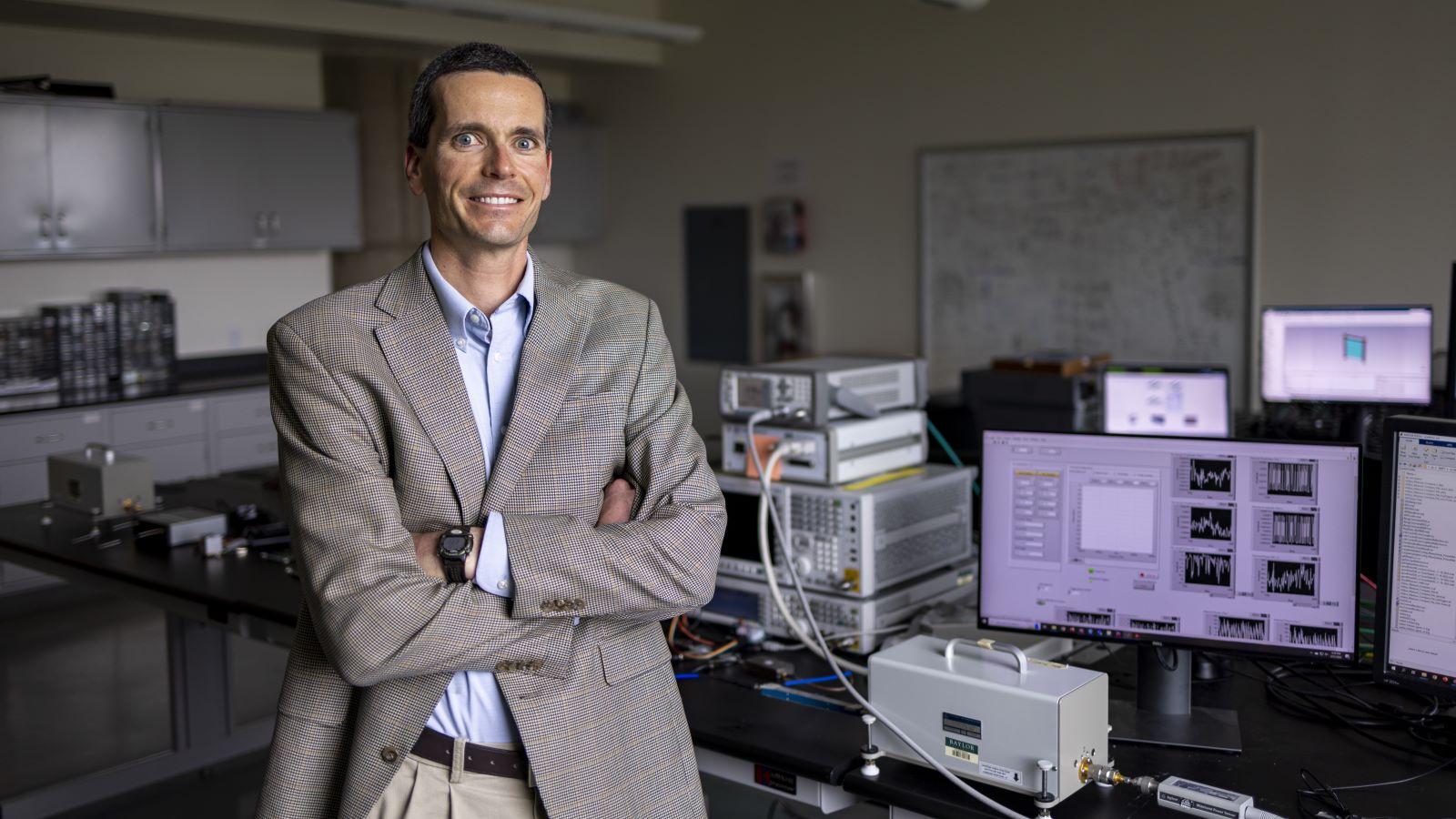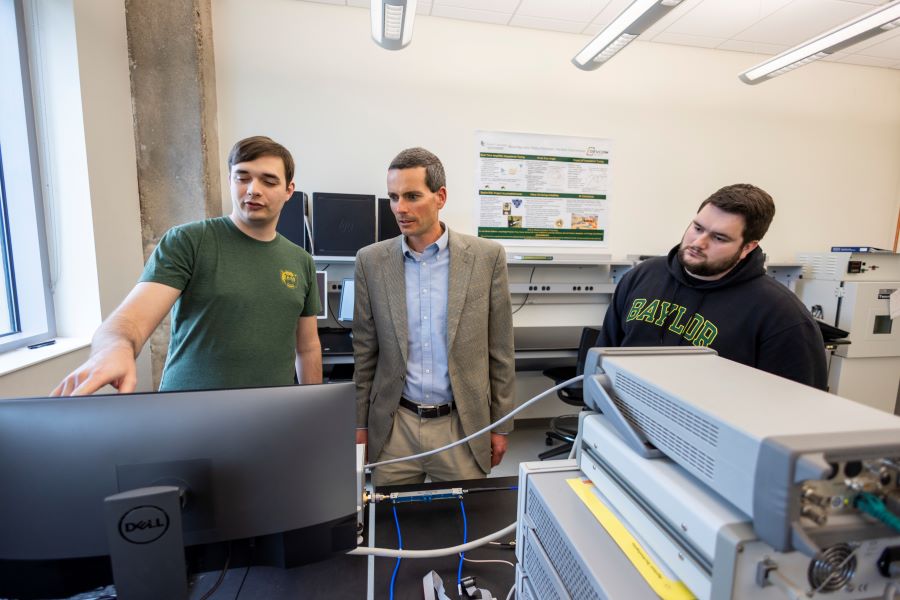Baylor University Launches SMART Hub, in Partnership with Department of Defense, for Groundbreaking Wireless Spectrum Research
Engineering professor Charles Baylis, Ph.D., to lead multi-institution efforts at $5 million research center

Charles Baylis, Ph.D., director of SMART Hub and professor of electrical and computer engineering at Baylor University. (Matthew Minard/Baylor University)
Contact: Lori Fogleman, Baylor University Media and Public Relations, 254-709-5959
Follow us on X (Twitter): @BaylorUMedia
WACO, Texas (Jan. 17, 2024) – Baylor University today officially announced the launch of the Spectrum Management with Adaptive and Reconfigurable Technology Hub (SMART Hub), a Department of Defense Spectrum Innovation Center to conduct multifaceted spectrum research to meet national defense needs. Directed by Charles Baylis, Ph.D., professor of electrical and computer engineering at Baylor’s School of Engineering and Computer Science, SMART Hub will organize research efforts from 17 institutions to revolutionize the increasingly crowded communication spectrum used by both U.S. Defense efforts and the population at large.
SMART Hub was made possible through a $5 million congressional appropriation championed by Congressman Pete Sessions (TX-17) and institutional support from Baylor University.
“We are grateful to God for this incredible opportunity with SMART Hub and excited for the responsibility that will ultimately support our military in peacetime and war,” Baylis said. “We’re incredibly grateful to Congressman Sessions for his work to turn this partnership with the Department of Defense into a reality, and for believing in this approach of developing adaptive and reconfigurable wireless systems that are able to share spectrum in real time. Many people at Baylor and our partner institutions have likewise contributed to these efforts in a profound way and have our heartfelt thanks.”
“I am proud to have championed the SMART Hub program in Congress, securing support for it in law,” Congressman Sessions said. “This program is crucial for addressing spectrum challenges in congested electromagnetic environments and ensuring our defense capabilities remain resilient and effective. I remain committed to supporting Baylor initiatives that strengthen our national security.”
Members of the SMART Hub research team from across these organizations will contribute expertise in communication systems, radar, circuits, spectrum security, economics, policy and more.
“SMART Hub will enable us to collaborate with 17 other institutions to develop the know-how for advancing sophisticated wireless communications systems for the U.S. military,” Provost Nancy Brickhouse, Ph.D., said. “This is built on many years of research by Charles Baylis and his team. We are grateful to Congressman Pete Sessions for his ability to acquire the congressional funding from Congress for this critically important research.”
The “real estate” of wireless transmission
Anyone who uses a cellular phone relies on the spectrum for communication, along with a variety of other wireless methods. Baylis describes the spectrum as the “real estate” of wireless transmission.
“When I send or receive a phone call, I have to use some type of bandwidth on the spectrum to transmit. It’s the same for anyone,” Baylis said. “Now, when you factor in the exponential increase in the number of wireless devices, you can imagine that the spectrum has become crowded to the point that there’s really no spectrum left.”
Both military and corporate organizations recognize that dwindling space will soon have an impact on their users. The need has led researchers to pursue entirely new approaches to spectrum communication, which will be the focus of SMART Hub.
“We will be working on groundbreaking technology that will revolutionize how we use the spectrum,” Baylis said. “Rather than fixed systems that use the same frequency and stay there, we’re designing systems that can adapt to their surroundings and determine how to successfully transmit and receive. It’s a true paradigm shift that requires the type of collaboration we will have in SMART Hub.”
That shift would require new algorithms and hardware adjustments capable of responsive shifts from one band to another. This is a key SMART Hub focus: the development of groundbreaking technologies to build and support adaptive and reconfigurable technologies for wireless communication, radar systems, and passive sensing. These efforts are bolstered by Baylor University’s commercialization efforts through the Technology Commercialization team within Baylor’s Office of the Vice Provost for Research.
Protecting the men and women of the U.S. Armed Forces
Reliable wireless communication is of critical importance to the Department of Defense in both peacetime and war, and the military must be able to adapt and work around interference. Radars are a good example, Baylis said, as they are vitally important to detect threats. However, complications arise when cellphones are brought into the radar band.
“You’ve got to have a solution to be able to sense despite the presence of these other wireless devices,” he said. “You need to be able to recognize interfering devices and shift your band of operation to avoid them. Our military needs new policies and technologies to make this possible.”
Exponential growth in devices has jammed the bandwidth available to a point that the U.S. Armed Forces needs the new options. Their partnership with SMART Hub will pursue these new adaptive technologies for military use, with the likelihood of future benefits to civilian communication as well.
“We are grateful for the opportunity to do our part to protect our men and women who are in harm’s way, and we want to do so without any compromise,” Baylis said. “Spectrum dominance is of extreme importance and that’s why these efforts are funded by Congress—it leads directly to success in the field and to the safety of our armed forces.”
A multi-institution approach, housed at Baylor
To pursue revolutionary technological advancements, SMART Hub is comprised of a multidisciplinary team of 29 researchers at 17 institutions. A complete list is available on the SMART Hub website.
“The SMART Hub team, led by Dr. Charles Baylis, has labored for years to secure significant funding for this important project,” said Daniel Pack, Ph.D., Dean of Baylor’s School of Engineering and Computer Science. “At the same time Baylor has attracted new, highly regarded research faculty from other institutions. Dr. Baylis and SMART Hub is an example of a group in which longer-tenured Baylor are also making substantial contributions, not just in helping Baylor reach its research goals, but in truly impacting the United States and the world. That eight ECS researchers are involved with this center speaks volumes about the quality of our faculty and how fully ECS supports SMART Hub’s work.”
Baylis described SMART Hub as an example of how Baylor has a unique opportunity as a Christian research university.
“We want to protect our nation’s freedom by developing novel wireless spectrum technologies,” Baylis said. “Through our speaking into this issue, we want people we come in contact with to experience the greatest freedom by trusting in Jesus and receiving the eternal life He offers.”
ABOUT BAYLOR UNIVERSITY
Baylor University is a private Christian University and a nationally ranked Research 1 institution. The University provides a vibrant campus community for more than 20,000 students by blending interdisciplinary research with an international reputation for educational excellence and a faculty commitment to teaching and scholarship. Chartered in 1845 by the Republic of Texas through the efforts of Baptist pioneers, Baylor is the oldest continually operating University in Texas. Located in Waco, Baylor welcomes students from all 50 states and more than 100 countries to study a broad range of degrees among its 12 nationally recognized academic divisions.
ABOUT THE SCHOOL OF ENGINEERING AND COMPUTER SCIENCE AT BAYLOR UNIVERSITY
Baylor’s School of Engineering and Computer Science (ECS) has been preparing its students for more than 25 years as innovators for worldwide impact by training graduates for professional practice and responsible leadership with a Christian worldview. Students can choose from majors including bioinformatics, computer science, data science, electrical and computer engineering, general engineering and mechanical engineering. ECS also offers graduate programs in all areas of study within the School. We stand out from the crowd through Christian commitment, R1 research, a strong community, personalized career support, expert accessibility, and leading practical experience. Visit the ECS website to learn more and follow on Instagram and Facebook.

